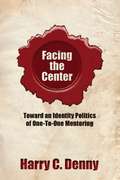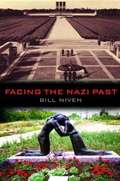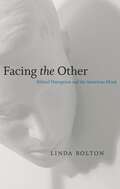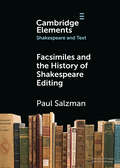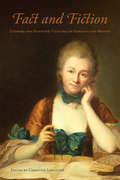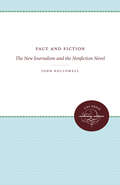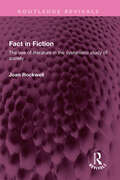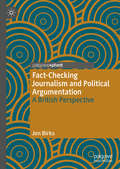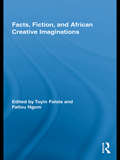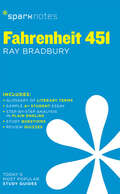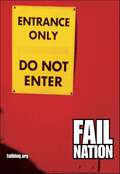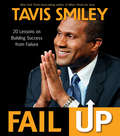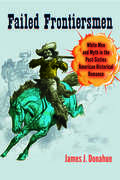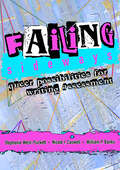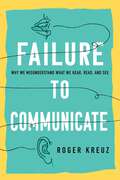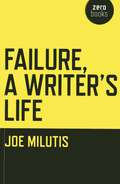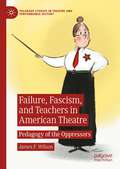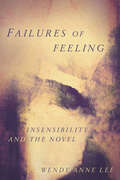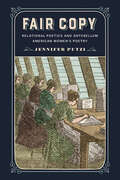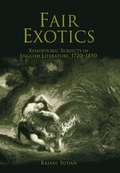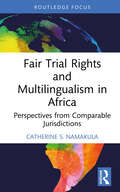- Table View
- List View
Facing the Center: Toward an Identity Politics of One-to-One Mentoring
by Harry C. DennyIn the diversity of their clients as well as their professional and student staff, writing centers present a complicated set of relationships that inevitably affect the instruction they offer. In Facing the Center, Harry Denny unpacks the identity matrices that enrich teachable moments, and he explores the pedagogical dynamics and implications of identity within the writing center. The face of the writing center, be it mainstream or marginal, majority or miority, orthodox or subversive, always has implications for teaching and learning. Facing the Center will extend current research in writing center theory to bring it in touch with theories now common in cultural studies curricula. Denny takes up issues of power, agency, language, and meaning, and pushes his readers to ask how they themselves, or the centers in which they work, might be perpetuating cultures that undermine inclusive, progressive education.
Facing the Nazi Past: United Germany and the Legacy of the Third Reich
by Bill NivenFacing the Nazi Past examines how the communist East viewed the events of these years very differently from West Germany during the Cold War. It explores the developments and debates that were symptomatic of this shift towards a more open confrontation with the past.
Facing the Other: Ethical Disruption and the American Mind (Horizons in Theory and American Culture)
by Linda Bolton"Bolton is admirably focused, centering broader ventures around precise turning points in the documents and incidents she has selected.... The book crosses generic boundaries... in the spirit of an other who transcends any single history or discipline." -- Religion and LiteratureLinda Bolton uses six extraordinarily resonant moments in eighteenth- and nineteenth-century American history to highlight the ethical challenge that the treatment of Native and African persons presented to the new republic's ideal of freedom. Most daringly, she examines the efficacy of the Declaration of Independence as a revolutionary text and explores the provocative question "What happens when freedom eclipses justice, when freedom breeds injustice?" Guided by the intellectual influence of philosopher Emmanuel Levinas, Bolton asserts that the traditional subject-centered -- or "I" -- concept of freedom is dependent on the transcendent presence of the "Other," and thus freedom becomes a privilege subordinate to justice. There can be no authentic freedom as long as others, whether Native American or African, are reduced from full human beings to concepts and thus properties of control or power. An eloquent and thoughtful rereading of the U.S. touchstones of democracy, this book argues forcefully for an ethical understanding of American literary history."Facing the Other is not a cultural history; its focus is the relevance of an ethical analytic to all of eighteenth- and nineteenth-century American literature.... Using Emmanuel Levinas to guide her discussions, Bolton argues that the way in which Americans valorize freedom as an ideal leads us to ignore our responsibilities for doing justice." -- American Literature
Facsimiles and the History of Shakespeare Editing (Elements in Shakespeare and Text)
by Paul SalzmanIs a facsimile an edition? In answering this question in relation to Shakespeare, and to early modern writing in general, the author explores the interrelationship between the beginning of the conventional process of collecting and editing Shakespeare's plays and the increasing sophistication of facsimiles. While recent scholarship has offered a detailed account of how Shakespeare was edited in the eighteenth century, the parallel process of the 'exact' reproduction of his texts has been largely ignored. The author will explain how facsimiles moved during the eighteenth and nineteenth century from hand drawn, traced, and type facsimiles to the advent of photographical facsimiles in the mid nineteenth century. Facsimiles can be seen as a barometer of the reverence accorded to the idea of an authentic Shakespeare text, and also of the desire to possess, if not original texts, then reproductions of them.
Fact and Fiction: Literary and Scientific Cultures in Germany and Britain
by Christine LehleiterFact and Fiction explores the intersection between literature and the sciences, focusing on German and British culture between the eighteenth century and today. Observing that it was in the eighteenth century that the divide between science and literature as disciplines first began to be defined, the contributors to this collection probe how authors from that time onwards have assessed and affected the relationship between literary and scientific cultures.Fact and Fiction's twelve essays cover a wide range of scientific disciplines, from physics and chemistry to medicine and anthropology, and a variety of literary texts, such as Erasmus Darwin's poem The Botanic Garden, George Eliot's Daniel Deronda, and Goethe's Elective Affinities. The collection will appeal to scholars of literature and of the history of science, and to those interested in the connections between the two.
Fact and Fiction: The New Journalism and the Nonfiction Novel
by John HollowellJournalists and novelists responded to the pervasive social changes of the 1960s in America with a variety of experiments in nonfiction. Those who have praised the vitality of the new journalism have seen it as a fusion of the journalist's passion for detail and the novelist's moral vision. Hollowell presents a critically sharp portrait of what the new journalists and novelists are doing and why. The author concludes that future writing will further obscure the difference between fact and fiction.Originally published in 1977.A UNC Press Enduring Edition -- UNC Press Enduring Editions use the latest in digital technology to make available again books from our distinguished backlist that were previously out of print. These editions are published unaltered from the original, and are presented in affordable paperback formats, bringing readers both historical and cultural value.
Fact in Fiction: The use of literature in the systematic study of society (Routledge Revivals)
by Joan RockwellFirst published in 1974, Fact in Fiction states that literature does not ‘reflect’ or ‘arise from’ society but is as much a functioning part of it as any social structure, institution or set of norms. The author shows that, however fantastic the content of fiction, it is a representation of social fact, not the mere random issue of private fantasy. Because of this, there is a regular and discernible pattern in which literature is related to other strands in the social web, which makes it possible to ‘read back’ from fiction to other social fact. An explanation is put forward for the normative power of fiction, from its origins in the apparent human necessity to communicate abstract concepts in terms of narrative accounts of human action. This book will be of interest to students of literature, sociology and history.
Fact or Opinion Reading Comprehension Book: Reading Level 3.5-5.0
by EdupressThis resource is an effective tool for instruction, practice, and evaluation of student understanding. It includes ideas on how to introduce fact or opinion to students, as well as activities to help teach and practice the concept.
Fact-Checking Journalism and Political Argumentation: A British Perspective
by Jen BirksThis timely book examines the role of fact-checking journalism within political policy debates, and its potential contribution to public engagement. Understanding facts not to operate in a political vacuum, the book argues for a wide remit for fact-checking journalism beyond empirically-checkable facts, to include the causal relationships and predictions that form part of wider political arguments and are central to electoral pledges. Whilst these statements cannot be proven or disproven, fact-checking can, and sometimes does, ask pertinent critical questions about the premises of those claims and arguments. The analysis centres on the three dedicated national British fact-checkers during the UK’s 2017 snap general election, including their activity and engagement on Twitter. The book also makes a close political discourse and argumentation analysis of three key issue debates in flagship reporting from Channel 4 News and the BBC.
Facts, Fiction, and African Creative Imaginations (Routledge African Studies)
by Toyin Falola Fallou NgomThis volume brings together insights from distinguished scholars from around the world to address the facts, fiction and creative imaginations in the pervasive portrayals of Africa, its people, societies and cultures in the literature and the media. The fictionalization of Africa and African issues in the media and the popular literature that blends facts and fiction has rendered perceptions of Africa, its cultures, societies, customs, and conflicts often superficial and deficient in the popular Western consciousness. The book brings eminent scholars from a variety of disciplines to sort out the persistent fictionalization of Africa, from facts pertaining to the genesis of powerful cultural, political or religious icons, the historical and cultural significance of "intriguing" customs (such as tribal marks), gender relations, causes of conflicts and African responses, and creative imaginations in contemporary African films, fiction and literature, among others.
Fahrenheit 451 SparkNotes Literature Guide (SparkNotes Literature Guide Series)
by Ray Bradbury SparkNotesFahrenheit 451 SparkNotes Literature Guide by Ray Bradbury Making the reading experience fun! When a paper is due, and dreaded exams loom, here's the lit-crit help students need to succeed! SparkNotes Literature Guides make studying smarter, better, and faster. They provide chapter-by-chapter analysis; explanations of key themes, motifs, and symbols; a review quiz; and essay topics. Lively and accessible, SparkNotes is perfect for late-night studying and paper writing. Includes:An A+ Essay—an actual literary essay written about the Spark-ed book—to show students how a paper should be written.16 pages devoted to writing a literary essay including: a glossary of literary termsStep-by-step tutoring on how to write a literary essayA feature on how not to plagiarize
Fail Nation: A Visual Romp Through The World Of Epic Fails
by failblog.orgFrom the underbelly of the nuts behind hit websites failblog.org and icanhascheezburger.com comes FAIL Nation, your silent guide and handler to the not-even-close-to-perfect nation of FAIL, chock-full of irrelevant tips and useless suggestions about why to shop, who to eat, and when to see. So fasten your exit and check for the nearest seatbelt—your FAIL plane departs now.
Fail Up: 20 Lessons On Building Success From Failure
by Tavis Smiley"Failure is an inevitable part of the human journey," says award-winning television and radio broadcaster and New York Times best-selling author Tavis Smiley. Smiley steps from behind the curtain of success to share intimate stories of his missteps, misdeeds, and often highly publicized miscalculations in Fail Up: 20 Lessons On Building Success From Failure. These instances of perceived "failures" were, in fact, "lessons" that shaped the principles and practices that now guide his life. Readers will find a kinship in Smiley’s humanness that inspires, informs, and reminds us of our ability to "fail up" in the face of life’s inevitable setbacks. The year-long celebration of Smiley’s 20th year anniversary in broadcasting will feature the Fail Up book tour.
Failed Frontiersmen: White Men and Myth in the Post-Sixties American Historical Romance (Cultural Frames, Framing Culture)
by James J. DonahueIn Failed Frontiersmen, James Donahue writes that one of the founding and most persistent mythologies of the United States is that of the American frontier. Looking at a selection of twentieth-century American male fiction writers—E. L. Doctorow, John Barth, Thomas Pynchon, Ishmael Reed, Gerald Vizenor, and Cormac McCarthy—he shows how they reevaluated the historical romance of frontier mythology in response to the social and political movements of the 1960s (particularly regarding the Vietnam War, civil rights, and the treatment of Native Americans). Although these writers focus on different moments in American history and different geographic locations, the author reveals their commonly held belief that the frontier mythology failed to deliver on its promises of cultural stability and political advancement, especially in the face of the multicultural crucible of the 1960s. Cultural Frames, Framing Culture American Literatures Initiative
Failing Sideways: Queer Possibilities for Writing Assessment
by William P. Banks Nicole I. Caswell Stephanie West-PuckettFailing Sideways is an innovative and fresh approach to assessment that intersects writing studies, educational measurement, and queer rhetorics. While valuing and representing the research, theory, and practice of assessment, authors Stephanie West-Puckett, Nicole I. Caswell, and William P. Banks demonstrate the ways that students, teachers, and other interested parties can find joy and justice in the work of assessment. A failure-oriented assessment model unsettles some of the most common practices, like rubrics and portfolios, and challenges many deeply held assumptions about validity and reliability in order to ask what could happen if assessment was oriented toward possibility and potential. Working to engage a more capacious writing construct, the authors propose queer validity inquiry (QVI) as a model for assessment that values failure, affect, identity, and materiality. These overlapping lenses help teachers honor parts of writing and learning that writing studies faculty have struggled to hold onto in a world overly focused on quickness and efficiency in schools. Through programmatic and classroom examples, Failing Sideways privileges what is valued in the classroom but traditionally ignored in assessments. Reimagining what matters in the teaching and learning of writing and using assessment data differently, this book demonstrates what writing can be and could do in a more diverse and just world.
Failure and the American Writer
by Gavin JonesIf America worships success, then why has the nation's literature dwelled obsessively on failure? This book explores encounters with failure by nineteenth-century writers - ranging from Edgar Allan Poe and Herman Melville to Mark Twain and Sarah Orne Jewett - whose celebrated works more often struck readers as profoundly messy, flawed, and even perverse. Reading textual inconsistency against the backdrop of a turbulent nineteenth century, Gavin Jones describes how the difficulties these writers faced in their faltering search for new styles, coherent characters, and satisfactory endings uncovered experiences of blunder and inadequacy hidden in the culture at large. Through Jones's treatment, these American writers emerge as the great theorists of failure who discovered ways to translate their own social insecurities into complex portrayals of a modern self, founded in moral fallibility, precarious knowledge, and negative feelings.
Failure to Communicate: Why We Misunderstand What We Hear, Read, and See
by Roger Kreuz&“Why didn&’t they understand me? I was as clear as I could be.&” Everyone has had this thought at one time or another. Research from the fields of psychology and cognitive science can provide concrete answers to these questions. In Failing to Communicate, Dr. Roger Kreuz explores the answers to these questionsWe are exposed to the dangers of miscommunication early in life. As children, we play the Telephone Game and learn an important lesson about the fragility of long communication chains. And as adults, we are constantly on the lookout for misunderstanding. People interrupt each other, on average, about every ninety seconds in order to check their understanding. Despite such vigilance, however, a great deal of what is said and written is not understood as intended.Miscommunication has led to military defeats, the loss of spacecraft, and even more tragically, accidents that cost human lives. It plays a role in road rage and social media feuds. It haunts the courtroom, the boardroom, and the singles bar. Failing to Communicate includes dozens of such examples and explains them in light of what researchers have discovered about how communication works—and why it so often fails.Research from psychology and cognitive science has revealed a host of specific factors that contribute to misunderstanding. Some of these have to do with how our minds make sense of what we hear and read, while others are the result of cognitive, social, and cultural factors. The very structure of a given language can be problematic as well. In short, there is no one reason for miscommunication: there are a host of underlying causes.Issues of misunderstanding have only multiplied as new mediums for communication have arisen. Emails, texts, and social media posts are even more problematic because they are impoverished modes of communication. Without facial cues, tone of voice, gestures, and even the creative use of silence, our intentions in these text-only mediums are even more likely to go awry.Failing to Communicate is intended to appeal, from beginning to end, to the general reader who wants to know more about why our attempts at communication fail so often
Failure, A Writer's Life
by Joe MilutisFailure, A Writer's Life is a catalogue of literary monstrosities. Its loosely organized vignettes and convolutes provide the intrepid reader with a philosophy for the unreadable, a consolation for the ignored, and a map for new literary worlds.
Failure, Fascism, and Teachers in American Theatre: Pedagogy of the Oppressors (Palgrave Studies in Theatre and Performance History)
by James F. WilsonThis timely and accessible book explores the shifting representations of schoolteachers and professors in plays and performances primarily from the twentieth and twenty-first centuries in the United States. Examining various historical and recurring types, such as spinsters, schoolmarms, presumed sexual deviants, radicals and communists, fascists, and emasculated men teachers, Wilson shines the spotlight on both well-known and nearly-forgotten plays. The analysis draws on a range of scholars from cultural and gender studies, queer theory, and critical race discourses to consider teacher characters within notable education movements and periods of political upheaval. Richly illustrated, the book will appeal to theatre scholars and general readers as it delves into plays and performances that reflect cultural fears, desires, and fetishistic fantasies associated with educators. In the process, the scrutiny on the array of characters may help illuminate current attacks on real-life teachers while providing meaningful opportunities for intervention in the ongoing education wars.
Failures of Feeling: Insensibility and the Novel
by Wendy Anne LeeThis book recovers the curious history of the "insensible" in the Age of Sensibility. Tracking this figure through the English novel's uneven and messy past, Wendy Anne Lee draws on Enlightenment theories of the passions to place philosophy back into conversation with narrative. Contemporary critical theory often simplifies or disregards earlier accounts of emotions, while eighteenth-century studies has focused on cultural histories of sympathy. In launching a more philosophical inquiry about what emotions are, Failures of Feeling corrects for both of these oversights. Proposing a fresh take on emotions in the history of the novel, its chapters open up literary history's most provocative cases of unfeeling, from the iconic scrivener who would prefer not to and the reviled stock figure of the prude, to the heroic rape survivor, the burnt-out man-of-feeling, and the hard-hearted Jane Austen herself. These pivotal cases of insensibility illustrate a new theory of mind and of the novel predicated on an essential paradox: the very phenomenon that would appear to halt feeling and plot actually compels them. Contrary to the assumption that fictional investment relies on a richness of interior life, Lee shows instead that nothing incites the passions like dispassion.
Fair Copies
by Matthew ZarnowieckiIn the latter half of the sixteenth century, English poets and printers experimented widely with a new literary format, the printed collection of lyric poetry. They not only investigated the possibilities of working with a new medium, but also wrote metaphors of human reproduction directly into their works. In Fair Copies, Matthew Zarnowiecki argues that poetic production was re-envisioned during this period, which was rife with models of copying and imitation, to include reproduction as one of its inherent attributes.Tracing the development of the English lyric during this crucial period, Fair Copies incorporates a diverse range of cultural productions and reproductions - from key poetic texts by Shakespeare, Sidney, Spenser, Gascoigne, and Tottel to legal breviaries, visual representations of song, midwives' manuals, and commonplace books. Also included are fifteen facsimile reproductions of poems in early printed books, with explanations and discussions of their importance. Calling upon these diverse sources, and examining lyric poems in their earliest manuscript and printed contexts, Zarnowiecki develops a new, reproductively centred method of reading early modern English lyric poetry.
Fair Copy: Relational Poetics and Antebellum American Women's Poetry (Material Texts)
by Jennifer PutziIn Fair Copy Jennifer Putzi studies the composition, publication, and circulation of American women's poetry in the antebellum United States. In opposition to a traditional scholarly emphasis on originality and individuality, or a recovery method centered on author-based interventions, Putzi proposes a theory and methodology of relational poetics: focusing on poetry written by working-class and African American women poets, she demonstrates how an emphasis on relationships between and among people and texts shaped the poems that women wrote, the avenues they took to gain access to print, and the way their poems functioned within a variety of print cultures. Yet it is their very relationality which has led to these poems and the poets who published them being written out of literary history. Fair Copy models a radical reading and recovery of this work in a way that will redirect the study of nineteenth-century American women's poetry.Beginning with Lydia Huntley Sigourney and ending with Elizabeth Akers Allen and Frances Ellen Watkins Harper, Putzi argues that relational practices like imitation, community, and collaboration distinguished the poetry of antebellum American women, especially those whose access to print was mediated by class or race. To demonstrate this point, she recovers poetry by the "factory girls" of the Lowell Offering, African American poet Sarah Forten, and domestic servant Maria James, whose volume Wales, and Other Poems was published in 1839. Putzi's work reveals a careful navigation of the path to print for each of these writers, as well as a fierce claim to poetry and all that it represented in the antebellum United States.
Fair Exotics: Xenophobic Subjects in English Literature, 1720-1850 (New Cultural Studies)
by Rajani SudanArguing that the major hallmarks of Romantic literature—inwardness, emphasis on subjectivity, the individual authorship of selves and texts—were forged during the Enlightenment, Rajani Sudan traces the connections between literary sensibility and British encounters with those persons, ideas, and territories that lay uneasily beyond the national border. The urge to colonize and discover embraced both an interest in foreign "fair exotics" and a deeply rooted sense of their otherness.Fair Exotics develops a revisionist reading of the period of the British Enlightenment and Romanticism, an age during which England was most aggressively building its empire. By looking at canonical texts, including Defoe's Robinson Crusoe, Johnson's Dictionary, De Quincey's Confessions of an English Opium Eater, and Bronte's Villette, Sudan shows how the imaginative subject is based on a sense of exoticism created by a pervasive fear of what is foreign. Indeed, as Sudan clarifies, xenophobia is the underpinning not only of nationalism and imperialism but of Romantic subjectivity as well.
Fair Trial Rights and Multilingualism in Africa: Perspectives from Comparable Jurisdictions (Law, Language and Communication)
by Catherine S. NamakulaThis book examines the best language fair trial practices of the courts in arguably the most multilingual region of the world. It contains an instructive list of standards and approaches to linguistic dynamics, which may be considered a language fair trial rights code. By way of jurisprudential analysis and scrutiny of constitutional imperatives and examination of legislation among the respective jurisdictions from the Sahel region, to the Horn of Africa, and the Cape, this publication presents peculiar country-specific practices and common standards aiming towards the realisation of a fair trial in a multilingual context. The exceptionally multilingual nature of legal processes in Africa makes the standards in the region instructive in the progression towards a universal language fair trial rights code. The book reveals valuable lessons across jurisdictions, including those outside Africa, and suggests measures that may be taken to improve existing approaches. It will be a valuable resource for academics, researchers, and policy-makers working in the areas of Law and Language, Legal Linguistics, Forensic Linguistics, Criminal Justice, and Comparative Law.
